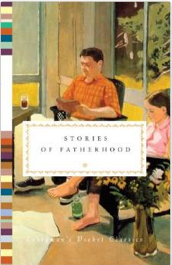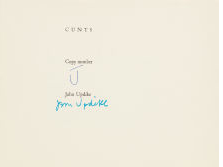On May 13, Everyman’s Library published a volume in their Everyman’s Pocket Classics series that revolves around the theme of fatherhood.
Stories of Fatherhood, edited by Diana Secker Tesdell, includes the John Updike short story “My Father’s Tears,” and is available in both hardcover and paperback.
Here’s the publisher’s description:
 “Stories of Fatherhood gathers more than a century of classic short stories about having, becoming, loving, and losing fathers.
“Stories of Fatherhood gathers more than a century of classic short stories about having, becoming, loving, and losing fathers.
“Frank O’Connor’s hilarious tale of a tiny boy’s war against his paternal rival in “My Oedipus Complex” sits beside Ann Packer’s touching portrait of a man preparing for the wonder and terror of his first child’s birth. At the other end of the lifespan, John Updike’s “My Father’s Tears,” Jim Shepard’s “The Mortality of Parents,” and William Maxwell’s “The man who lost his father” bring us face to face with a loss that is like no other.
“In between, we encounter a full range of emotions connecting men and their offspring: tenderness and devotion, anxiety and incomprehension, admiration and regret. Powerful patriarchs cast a long shadow in Katherine Mansfield’s “The Daughters of the Late Colonel” and D. H. Lawrence’s “The Christening,” while Edith Wharton’s “His Father’s Son” sheds a more ironic light on the paternal legacy. E. L. Doctorow’s young protagonist, forced to write letters impersonating his dead father, arrives at a deeper understanding of him, while in Helen Simpson’s “Sorry?” an old man’s hearing aid seems to reveal what his children secretly think about him.
“Paternal bonds are forged outside biology, too: Graham Swift portrays a man wistfully seeking a substitute son, while Guy de Maupassant’s forlorn waif triumphantly acquires an ideal father. In these twenty stories, an array of great writers—ranging from Kafka, Joyce, and Nabokov to Raymond Carver, Harold Brodkey, and Andre Dubus—offers a wonderfully varied assortment of fictional takes on paternity.”
Read too, if you’re curious, a review/article by Peter Tonguette for The Christian Science Monitor: “‘Stories of Fatherhood’ offers 17 portraits of parenting from a very diverse group of writers.”
List price for the hardcover is $16.00, but Amazon.com is currently selling it for $12.19.







